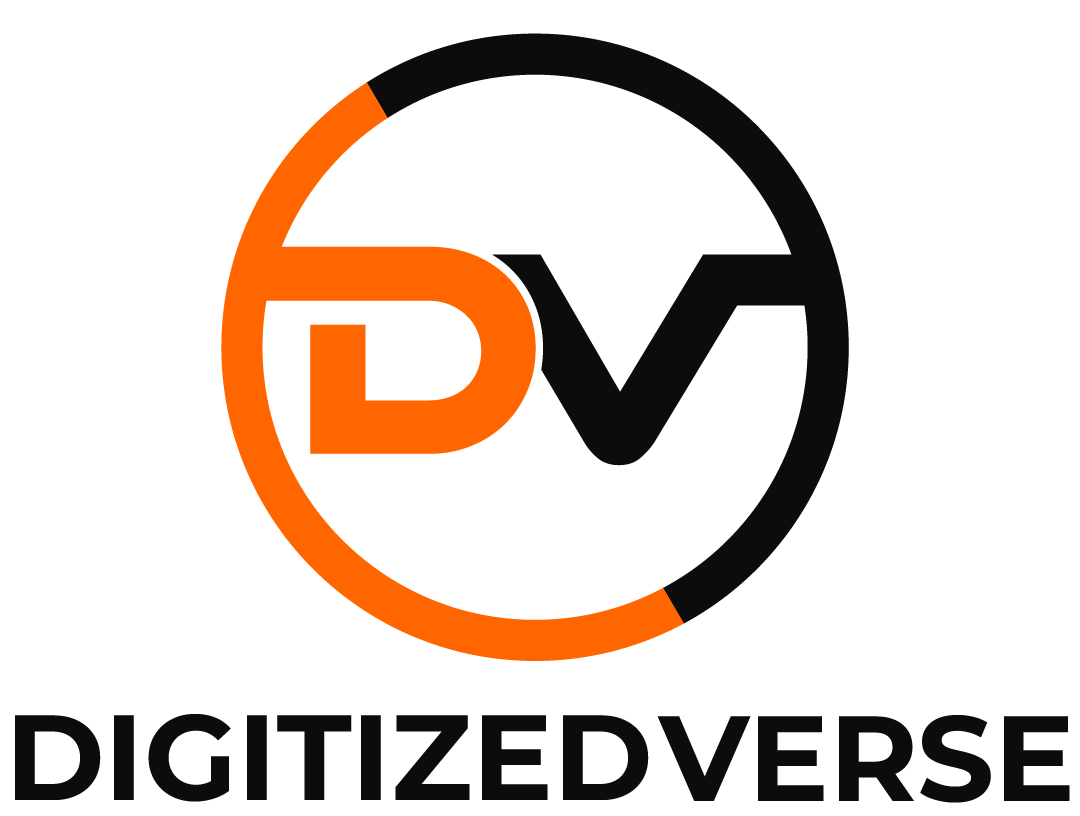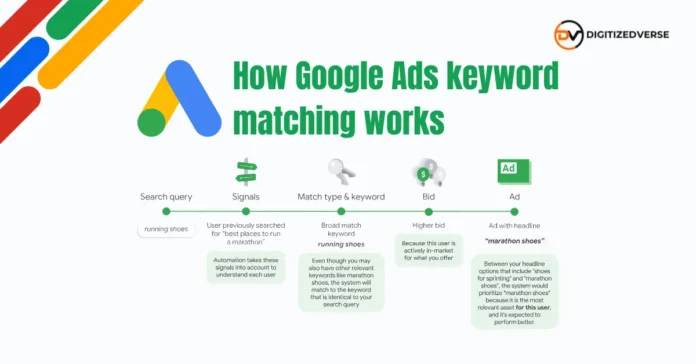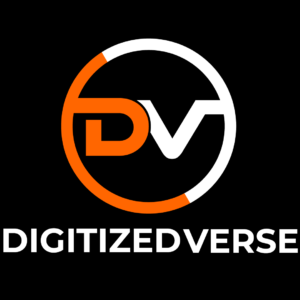Google Ads keyword matching has evolved far beyond simple keyword-to-query pairing.
Today, it uses AI, machine learning, and natural language understanding to ensure advertisers reach the right users, with the right message, at the right moment.
Whether you’re running a small local campaign or managing enterprise-level accounts, understanding how Google Ads matches keywords to searches is the foundation of a high-performing campaign.
Let’s break down exactly how it works — from query interpretation to ad auction.
How Google Interprets a Search Query
When a user types a search on Google, the system doesn’t just look for literal keyword matches.
Instead, it interprets the meaning and intent behind the query using AI models like BERT and MUM (Multitask Unified Model).
This process considers:
- Spelling corrections (e.g., “snikers” → “sneakers”)
- Synonyms (e.g., “car” → “automobile”)
- Context and related concepts (e.g., “best phone for gaming” → “high-performance smartphones”)
After interpretation, Google forms a retrieval query, which is then used to identify all potentially relevant keywords marked as “enabled.”
Learn more about how Google’s machine learning models understand search intent.
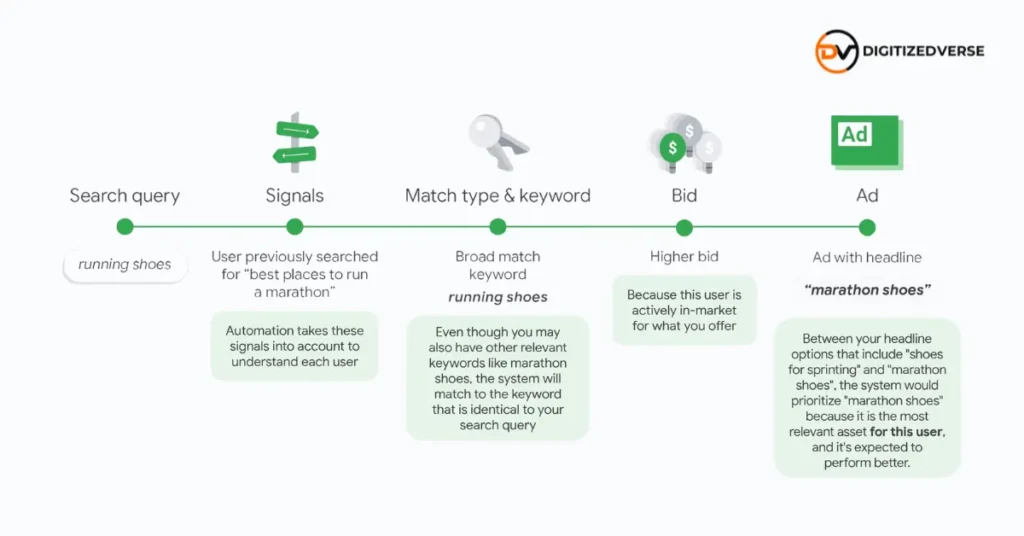
a headline of “running shoes”–even though you might think the latter is more relevant to the query. Because
Google AI is able to incorporate more information to better understand the user’s intent, it’s able to personalize the
right message for each search.
Keyword Eligibility and Match Types
Once the system retrieves potential matches, it checks eligibility based on keyword match type.
- Exact Match: Matches searches with the same intent or meaning as your keyword.
- Phrase Match: Matches searches that include the meaning of your keyword.
- Broad Match: Matches searches related to your keyword, even without the same words.
The eligibility process also considers campaign-level settings like budget, ad group structure, negative keywords, and audience targeting.
You can read more about keyword match types in Google Ads.
How Google Prioritizes Keywords
When multiple eligible keywords exist in your account, Google automatically prioritizes the most relevant one.
If a keyword exactly matches a user’s search term (or its spell-corrected version), it takes priority — regardless of match type.
This eliminates the need to duplicate the same keyword across exact, phrase, and broad match types.
💡 Pro Tip: Overlapping or duplicate keywords can confuse your Smart Bidding strategy and lead to higher costs with less data efficiency.
Understanding Campaign and Ad Group Eligibility
Beyond keywords, Google checks whether your campaigns and ad groups are eligible to show ads.
This includes:
- Budget availability
- Geotargeting settings
- Audience and schedule filters
- Approved ads and valid landing pages
- Negative keyword exclusions
If any of these criteria fail, your ad won’t enter the auction — even if your keyword matches perfectly.
How Responsive Search Ads Choose Creatives
Once an eligible ad group is found, Google’s Responsive Search Ads (RSAs) system assembles the best-performing creative combination.
It dynamically tests and evaluates different headlines and descriptions to predict which ad variation is most relevant to the user’s intent.
The chosen ad creative is the one expected to maximize engagement and conversion.
How Google Determines Bids and Ad Rank
Next comes bidding — the heart of Google Ads performance.
If you’re using Smart Bidding, Google sets a unique, real-time bid for each auction based on signals like:
- Device, location, and time
- User search intent and history
- Predicted conversion likelihood
Learn more about Smart Bidding strategies on Google Ads.
If you’re using manual bidding, Google simply applies your fixed bid and modifiers.
Then, Ad Rank is calculated — a score that determines your ad’s position based on:
- Bid amount
- Ad relevance
- Expected click-through rate (CTR)
- Landing page experience
You can explore how Ad Rank works here.
Ad Selection and Relevance Signals
Google selects the ad with the best combination of Ad Rank and relevance.
To determine relevance, the system considers:
- The meaning of the search query
- The keywords and ad copy in your ad group
- The landing page content and performance
If broad match keywords are eligible, Google will only consider them from the most contextually relevant ad groups.
This ensures the system doesn’t show irrelevant ads or duplicate efforts.
Inside the Google Ads Auction
Finally, all advertisers’ top-eligible ads enter the Google Ads auction.
Each advertiser only submits their best-performing ad — meaning you never compete against yourself.
The auction runs in milliseconds, determining which ads appear and in what order, based on Ad Rank and overall performance likelihood.
This structure eliminates the need for redundant keyword setups and helps Smart Bidding optimize holistically across your account.
Why Understanding Keyword Matching Matters
Knowing how Google Ads keyword matching works helps you:
- Reduce keyword duplication and simplify campaign structure
- Improve ad relevance and CTR
- Boost Smart Bidding accuracy and ROI
- Align your campaigns with how Google’s AI actually interprets intent
For marketers and advertisers, this understanding is a competitive advantage.
It allows you to focus on strategy and creativity — while letting Google’s machine learning handle precision targeting and optimization.
Example of how Google Ads keyword matching works
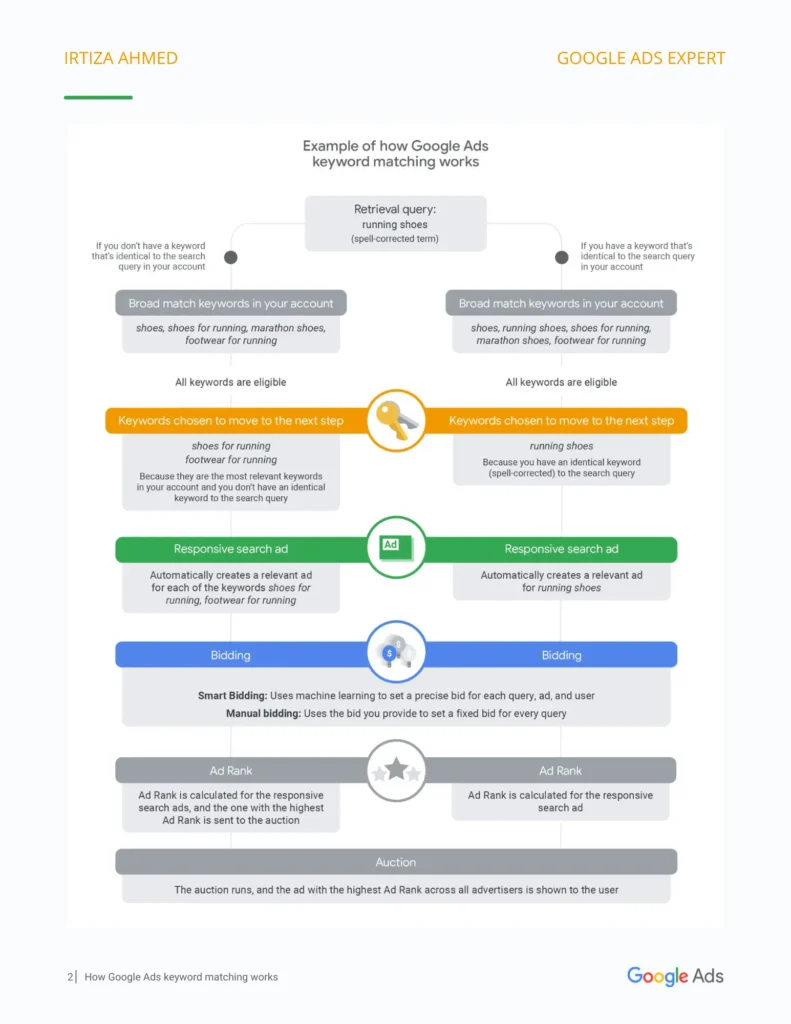
Best Practices for Smarter Keyword Matching
- Use broad match with Smart Bidding to reach the widest, most relevant audience.
- Group keywords by theme, not by match type.
- Remove redundant keywords that split performance data.
- Monitor search terms reports to refine targeting.
- Let AI signals guide optimization rather than rigid keyword lists.
Conclusion
Google Ads keyword matching is now an intent-based, AI-driven system, not a simple text match.
By aligning your campaigns with how Google actually interprets search behavior, you can drive stronger relevance, lower CPCs, and higher ROI.
👉 Need help auditing or restructuring your campaigns?
Contact a certified Google Ads expert — and make sure every click works toward your goals.

